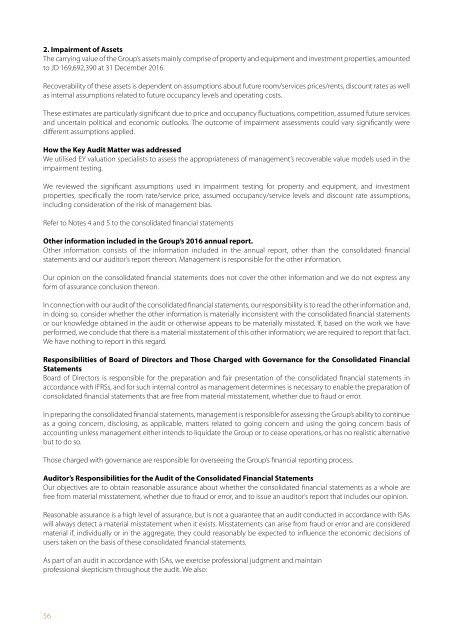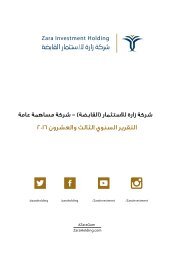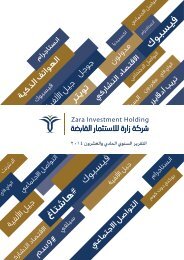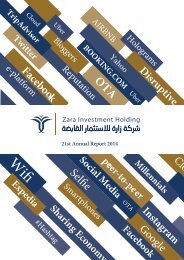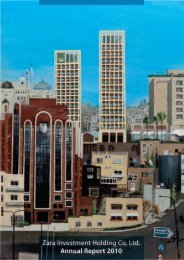ZaraAnnual-English2016
You also want an ePaper? Increase the reach of your titles
YUMPU automatically turns print PDFs into web optimized ePapers that Google loves.
2. Impairment of Assets<br />
The carrying value of the Group’s assets mainly comprise of property and equipment and investment properties, amounted<br />
to JD 169,692,390 at 31 December 2016.<br />
Recoverability of these assets is dependent on assumptions about future room/services prices/rents, discount rates as well<br />
as internal assumptions related to future occupancy levels and operating costs.<br />
These estimates are particularly significant due to price and occupancy fluctuations, competition, assumed future services<br />
and uncertain political and economic outlooks. The outcome of impairment assessments could vary significantly were<br />
different assumptions applied.<br />
How the Key Audit Matter was addressed<br />
We utilised EY valuation specialists to assess the appropriateness of management’s recoverable value models used in the<br />
impairment testing.<br />
We reviewed the significant assumptions used in impairment testing for property and equipment, and investment<br />
properties, specifically the room rate/service price, assumed occupancy/service levels and discount rate assumptions,<br />
including consideration of the risk of management bias.<br />
Refer to Notes 4 and 5 to the consolidated financial statements<br />
Other information included in the Group’s 2016 annual report.<br />
Other information consists of the information included in the annual report, other than the consolidated financial<br />
statements and our auditor’s report thereon. Management is responsible for the other information.<br />
Our opinion on the consolidated financial statements does not cover the other information and we do not express any<br />
form of assurance conclusion thereon.<br />
In connection with our audit of the consolidated financial statements, our responsibility is to read the other information and,<br />
in doing so, consider whether the other information is materially inconsistent with the consolidated financial statements<br />
or our knowledge obtained in the audit or otherwise appears to be materially misstated. If, based on the work we have<br />
performed, we conclude that there is a material misstatement of this other information; we are required to report that fact.<br />
We have nothing to report in this regard.<br />
Responsibilities of Board of Directors and Those Charged with Governance for the Consolidated Financial<br />
Statements<br />
Board of Directors is responsible for the preparation and fair presentation of the consolidated financial statements in<br />
accordance with IFRSs, and for such internal control as management determines is necessary to enable the preparation of<br />
consolidated financial statements that are free from material misstatement, whether due to fraud or error.<br />
In preparing the consolidated financial statements, management is responsible for assessing the Group’s ability to continue<br />
as a going concern, disclosing, as applicable, matters related to going concern and using the going concern basis of<br />
accounting unless management either intends to liquidate the Group or to cease operations, or has no realistic alternative<br />
but to do so.<br />
Those charged with governance are responsible for overseeing the Group’s financial reporting process.<br />
Auditor’s Responsibilities for the Audit of the Consolidated Financial Statements<br />
Our objectives are to obtain reasonable assurance about whether the consolidated financial statements as a whole are<br />
free from material misstatement, whether due to fraud or error, and to issue an auditor’s report that includes our opinion.<br />
Reasonable assurance is a high level of assurance, but is not a guarantee that an audit conducted in accordance with ISAs<br />
will always detect a material misstatement when it exists. Misstatements can arise from fraud or error and are considered<br />
material if, individually or in the aggregate, they could reasonably be expected to influence the economic decisions of<br />
users taken on the basis of these consolidated financial statements.<br />
As part of an audit in accordance with ISAs, we exercise professional judgment and maintain<br />
professional skepticism throughout the audit. We also:<br />
56


